Sheffield Doc/Fest 10: TOO BEAUTIFUL: OUR RIGHT TO FIGHT: The Unsweet Science (& Interviews)
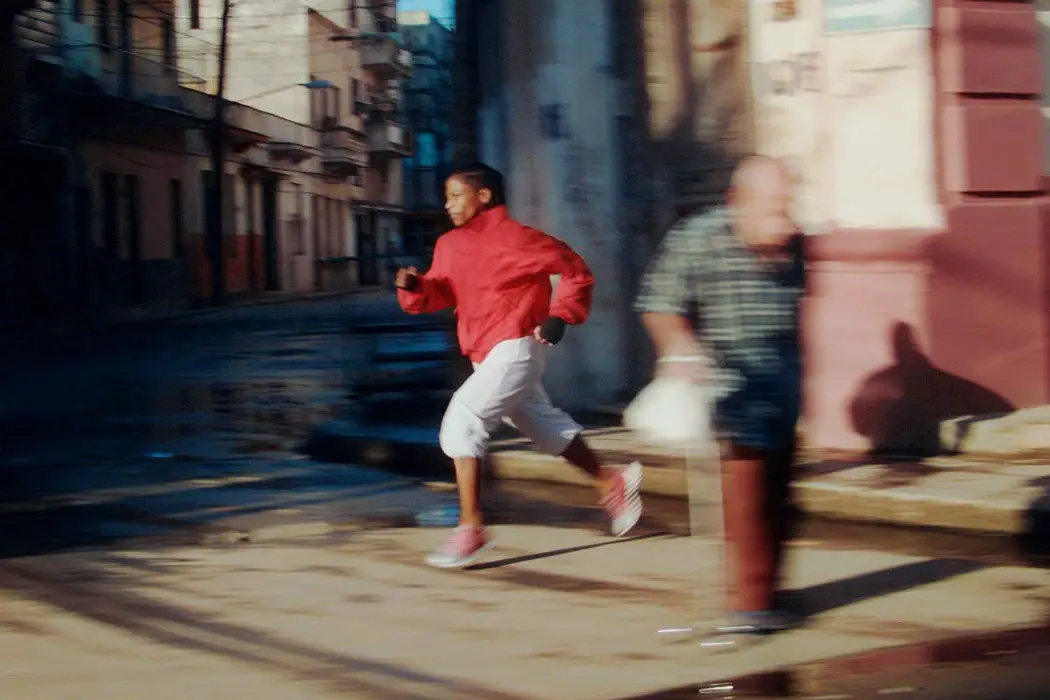
Musanna Ahmed is a freelance film critic writing for Film…
Throughout the past century in Cuba, from Kid Gavilán to Guillermo Rigondeaux, the history of boxing has been rich, even during Fidel Castro’s half-century ban, but women have been considered banned from the sport. There’s no official support for them and they’ve been subject to refusal of entry in international competitions.
Maceo Frost’s awesome documentary Too Beautiful: Our Right to Fight finely captures female boxer Namibia Flores Rodriguez leading her own Cuban revolution, in the fight to allow women to compete at a professional level in the run-up to the Rio Olympics.
Too Beautiful: Our Right to Fight
There have seldom been more electrifying ways to begin a documentary and succinctly capture character and context than the first few minutes of Too Beautiful. We start with a couple of pictures of some of the country’s boxing greats. We then look down a corridor towards a room with a boxing room, an unfairly compromised El Dorado for female fighters in Cuba. As the camera moves forward in slow motion, the text on-screen states the facts, like when Pedro Roque, former head trainee for the Cuban boxing selection, declared a few years ago that “Cuban women are meant to be beautiful, not get hit in the face.” That’s the only sentence necessary to understand the ancient political stance on the subject matter.

Once the key information is swiftly disclosed, the slow motion is discontinued and two figures burst from the left and right side of the frame. They swiftly head into the ring and immediately throw hands. It’s Namibia and her sparring partner. The session is shot from both boxers’ intense points-of-view. Namibia’s power and strength are sourced from the fallacious reception she echoes in her internal monologue. “You’re too old for this. All the sacrifices aren’t worth it.” There’s a slight scorn in her enunciation, as if she’s mocking the naysayers who have told her such things. The jokes on them – she’s proving them wrong with every punch.
Her strength and speed are synchronised with a hypnotic drumming pattern. It speeds up when she does and even fades as she gets rocked at one point. It’s a complete soundscape. Frost works the magic of the match-cut – a perfectly placed cut to her shadow boxing on the street against a hazy landscape stops the music and brings everything into the perspective of reality. Her truth is, she’s pained about the fact that, as a woman, she can’t represent her country.
Rather than dwelling on things for long, though, she chooses to persist. “I will die a boxer”, she firmly states. This opening sequence works as a powerful short film in itself. It plays like the slickest Adidas advert and that makes sense because the film was made in collaboration with the sporting goods giant. Make no mistake, this is no commercial for an Adidas product – the rest of the film tracks the distressing journey on how Namibia became the formidable fighter that she is today.
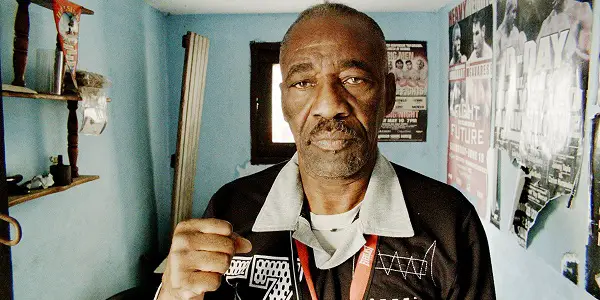
She shares details of a rough childhood that involved physically abusive grandparents, sleeping on the streets, being responsible for the whole family’s housework and occasionally running away from Havana with her brother. Nardo, her boxing teacher, has been a father figure to her. We hear from him and various other significant supporting characters in Namibia’s life. One of them is her friend Eris Nelsy Torres, who’s inspired to take up boxing because of her. Their worthwhile anecdotes and affinities for Namibia are helpful in establishing the portrait of an athlete who, like many of the great boxers, prefers to do the talking with her fists.
As well as in one of the great opening sequences in recent times, the entire film is constructed with the same technical finesse across all departments. The cinematography is stunning, the score is enrapturing, and the fusion of the two is nothing short of masterful. See it on the biggest screen possible for the cinematic elements, and walk away galvanised to support Cuba’s boxing women. Inspirational and sensational.
Interview with Maceo Frost and Namibia Flores Rodriguez
There was so much about the technique and story of Too Beautiful captivated me so I was grateful to speak to both director Maceo Frost and the star Namibia Flores Rodriguez herself about both the making and the message of their exhilarating documentary.
Musanna Ahmed for Film Inquiry: To begin with, how did your worlds collide?
Namibia Flores Rodriguez: We met through a mutual friend, Victor. He saw that there was potential for a story to be made between the two of us, so he said to get together and do something.
Coming together from different parts of the world (Maceo from Sweden and Namibia from Cuba) what was production like regarding a potential communication barrier between the two of you?
Namibia Flores Rodriguez: The language wasn’t really a barrier between us because we had so much in common and we could easily figure out what we wanted to film in terms of my boxing and training regime.
Maceo Frost: We also made sure that all the members of the team spoke Spanish. I learned enough to do some basic communication.
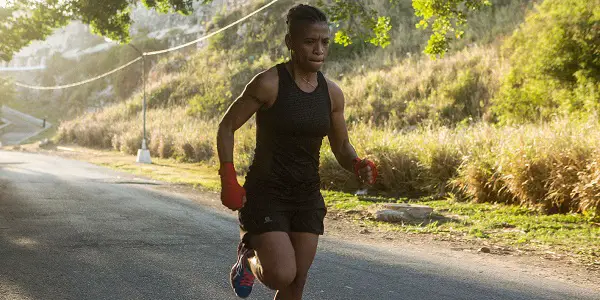
Namibia, how do you feel about the film now that you’ve seen it?
Namibia Flores Rodriguez: It was really great. I loved to see the development of my career in boxing and my life over the hour of the film.
It’s clear in the documentary that you have a lot of support in Havana and you’re inspiring other women to pick up boxing too. Generally speaking, is it safe to say that the people of Cuba largely support women boxing?
Namibia Flores Rodriguez: I do think there is great support from the people, as you can see from my family, friends and trainers in the film, but I’m hoping the film starts a nationwide movement that expands the support for women around the country and creates a change.
What do you see as the future of the story of women boxing in Cuba now that you’ve shared your story?
Namibia Flores Rodriguez: I think the sport will be developed further for women and I think we’ll be able to pursue further in the fight to allow women to compete at a professional level.
Maceo, was it a deliberate decision to avoid politics?
Maceo Frost: Definitely. When it comes to those issues, I think it’s good for people to paint the picture for themselves. In the film, you notice that there’s an evolution in Namibia from beginning to end but you also see all the sides. You see the sides that are pro-Cuba and the ones that aren’t. It’s better to tell the story like that so you build your own perception.
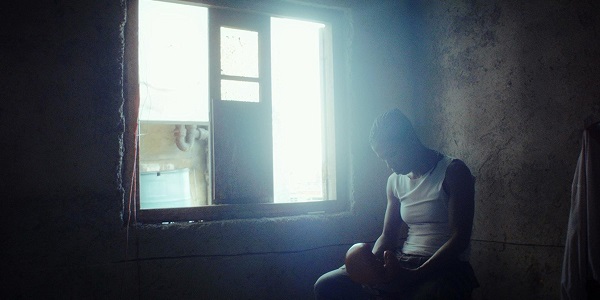
Was this subject matter something you were aware of prior to making the film? Did your perspective on boxing change?
Maceo Frost: I didn’t know about this before I went to Cuba. A love for boxing grew in me after spending time with Namibia. The nicest thing was seeing, over the years, that Namibia had inspired other girls to fight. The first year it was just her. Three years later, there was so many of them and they all looked up to Namibia. It was powerful to see her impact in Havana.
What can Cuba, or even the world, do to support women who want to professionally box in Cuba?
Namibia Flores Rodriguez: I think what people can do is to keep supporting the women that are continuing to fight despite the resistance. They can stay aware and support what these women are doing, making sure they keep going and not giving up, because I think it’s the support from the people that will be helpful in breaking the barriers for the future.
Is there any intention to have this film seen at a federal level in Cuba?
Namibia Flores Rodriguez: We definitely want the government to see the film but what we first want is the people of Cuba to see it. All these bootleg stores that sell DVD’s, which are all throughout Havana, we want to plant DVD’s in all of these stores so that they can be sold and the film can spread around the cities.
Is that strategy the result of potential censorship?
Maceo Frost: I would say that it’s rather to do with the way people see films. There’s not really any internet, and you could get it on the internet but it costs like 10 bucks to browse the net for an hour and the salaries aren’t enough for many people to do that. So, if we want people to see it, this is the most effective way.
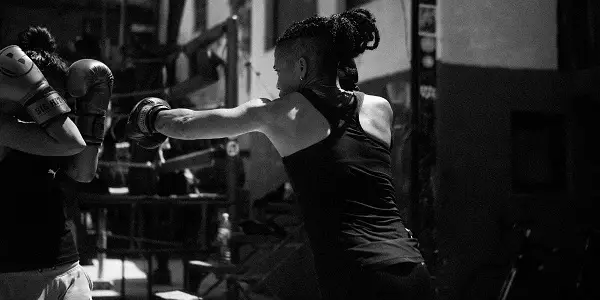
You’ve done such a fantastic job in constructing the film in post-production. Can you tell me more about the editing process and how you put together the sound and visuals with such style?
Maceo Frost: It was a really fun process. We edited for six months and that time frame is not always easy. You struggle sometimes because it’s a huge puzzle that you have to finish… but me and Andreas [Arvidsson, the film’s editor] do a lot of commercials together between our passion projects. We’re from the Vimeo generation, we used to do shorts with fast cuts and bombastic music, so I think some of that style is something we really wanted to incorporate in the film.
Because of this, sometimes it looks like a sports brand commercial but that’s just a style of editing that we like. We wanted something that gives you goosebumps. We wanted to make this documentary as powerful as seeing a Hollywood movie with the music, sound effects and visuals. It also fit really well because it’s the perfect way to showcase Namibia’s strength and the power of her story.
Talking about sports branding, can you tell us about Adidas’ involvement with the film?
Maceo Frost: Yeah. So, we went to Cuba three times and, after the second time, we noticed that the film was becoming a little bit longer than we originally thought. It was initially 35-minutes and we thought we should make it 50. I was shopping around trying to get funding for it and had the worst luck ever – my computer crashed during one of the sales meetings so we didn’t get anything. I called a friend of mine called Raymond [van der Kaaij] who is now one of the executive producers for the film. He said, “Okay, give me two weeks and I’ll see what I can do.” He called me back eight hours later and told me, “Maceo, Adidas is on board and they’re gonna let you do whatever you want.”
I think they fell in love with Namibia’s story and the people there are really passionate about getting this film out and making people feel empowered by Namibia, so it was really easy to work with them. The cool thing about having a brand involved, especially in a story like this, is that it gives you extra leverage to do more whilst retaining creative control.
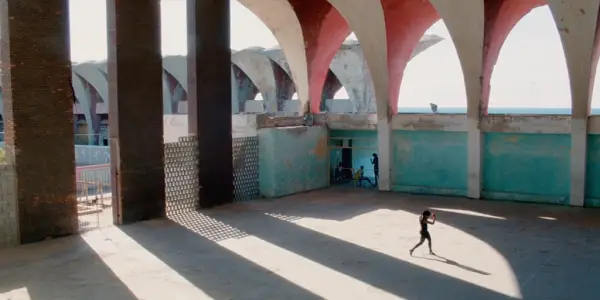
Going back to the editing process, the music is very important to the film. Can you tell us more about the selections and the influences?
Maceo Frost: I’m a drummer myself and the editor is the biggest music fan you will ever find, plus he’s an aspiring drummer. Lionel (Cabrera), the DOP, is a musician too. We all have this musical background and, when in Cuba, you always notice music wherever you go. That was something we really wanted to capture.
Also, one of the things that Nardo says is, “What Cuban cannot dance?” There’s something about that movement that we wanted to connect between the boxing and Cuba – boxing is like a dance itself. There’s a hidden message in that, a lot of the rhythms that are in the film are Brazilian rhythms – they represent the fight to go to the Olympics in Rio. Another detail is that one of Namibia’s guardian spirits is Changó and we have a choir singing Changó chants, which represent the warrior’s spirit.
What are you hoping for people to ultimately take away from this film?
Maceo Frost: First, we want women’s boxing to be approved in Cuba. Second, whilst that’s a major issue, there are things in Namibia’s story that are empowering that aren’t to do with boxing. I’ve had people come up to me and tell me that, by seeing Namibia’s story, they’ve felt they’ve gained the strength to go on with their lives. Those are the major things – to inspire people and to change the ban.
Are you already feeling the impact of this film, Namibia?
Namibia Flores Rodriguez: I feel the impact on myself after seeing my story on screen but I also feel like it’s impacted others because people have told me how it’s spoken to them and been an inspiration to them. It’s helped them see that they are able to chase their dreams, like I have.
Film Inquiry would like to thank Maceo Frost and Namibia Flores Rodriguez for their time and insight.
Doc/Fest 10 is a series of combined review and interview features for ten films seen at the Sheffield International Documentary Festival 2018. You can view the rest of the features by clicking here.
Does content like this matter to you?
Become a Member and support film journalism. Unlock access to all of Film Inquiry`s great articles. Join a community of like-minded readers who are passionate about cinema - get access to our private members Network, give back to independent filmmakers, and more.
Musanna Ahmed is a freelance film critic writing for Film Inquiry, The Movie Waffler and The Upcoming. His taste in film knows no boundaries.













